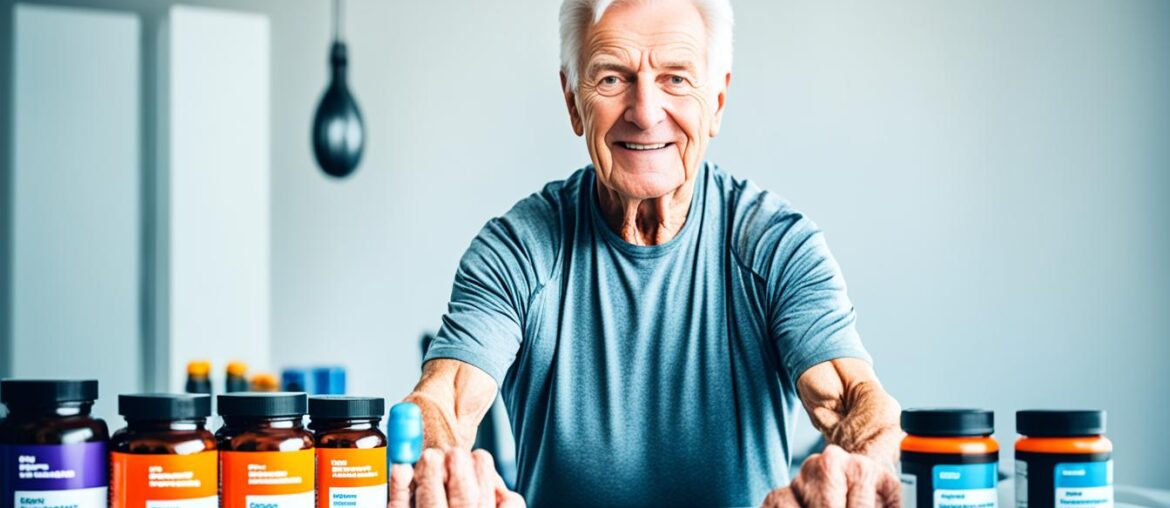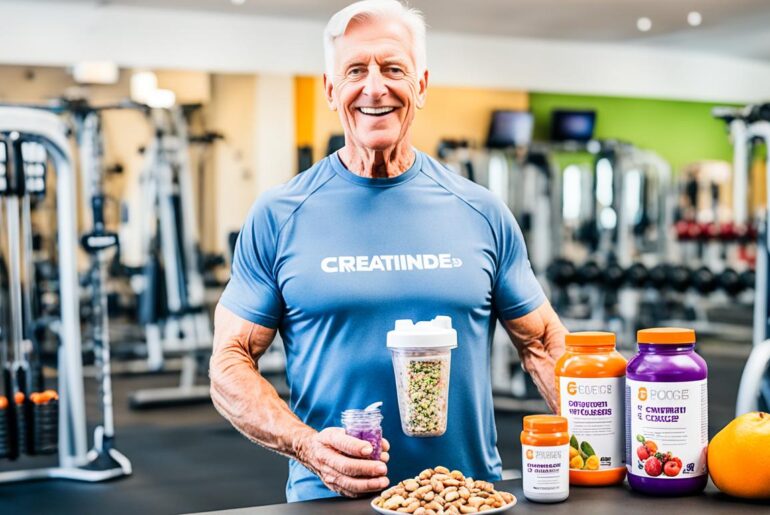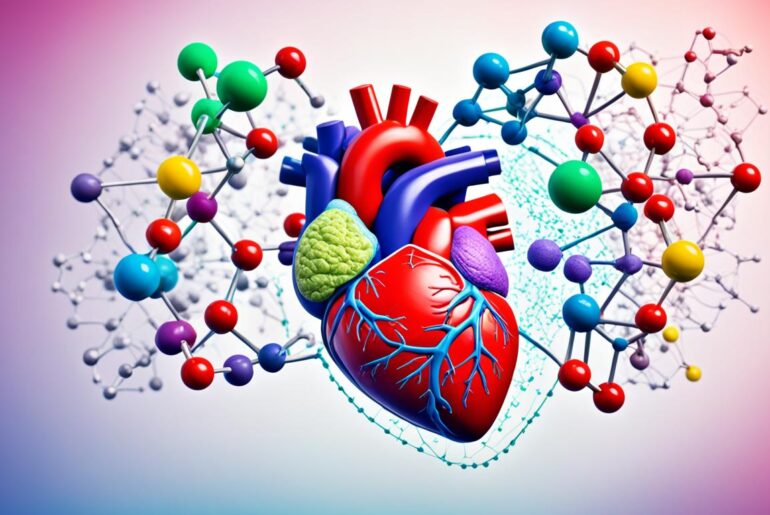Imagine a compound so integral to our energy systems that the human body naturally produces nearly its own weight of it over a lifespan. That compound is creatine, and while every cell in the body benefits from it, its role becomes particularly critical as we navigate the complexities of aging. My investigation into the intersections of creatine, kidney health, and the elderly reveals a tapestry of nutritional science that challenges longstanding myths and opens new doors to aging wellness. The concern for renal health in the elderly underscores the importance of optimizing elderly nutrition with the potential of elder care practices to include creatine—finding ways to enhance vitality without compromising kidney function.
In an era where the elderly population is rapidly rising, understanding how to support the interplay between an aging body and essential nutrients like creatine has never been more paramount. Accumulating evidence suggests that creatine, a staple in the fitness world, might just be as crucial for elder care, provided that its use is approached with a keen sense of balance and awareness towards renal health.
Albeit concerns over the years, research has consistently shown that for those with healthy renal function, creatine supplementation does not appear to impair kidney health—opening up a new realm of possibilities for maintaining strength and vitality as we age. Within the canvas of my research, I’ve woven through the threads of scientific evidence, to present a clear picture of how creatine can play a beneficial role in the lives of our aging population.
Key Takeaways
- Creatine supports essential energy systems, proving crucial in aging muscle and brain tissue.
- Supplementation addresses aging-related muscle mass and bone density loss, without negatively impacting healthy kidneys.
- With life’s progression, the natural decline of muscle function can be countered through informed creatine use.
- The tailored integration of creatine into elderly nutrition is pivotal, especially for those with lower dietary intake from natural sources.
- Rigorous scientific studies drive a positive shift in how we perceive creatine’s safety for kidney health in the context of elder care.
- Maintaining a balance between the benefits of creatine for aging wellness and individual renal health status is essential.
Understanding Creatine: A Vital Energy Source for Elderly Muscles
As we delve into the complexities of how the body sustains muscle strength, particularly in the context of aging, we uncover the pivotal role of creatine. A molecule that’s essential for energy production, creatine is the cornerstone of maintaining vitality and combating the decline of muscle mass often experienced by the elderly.
What Is Creatine and How Is It Produced in the Body?
In my journey to explore the wonders of creatine production, it’s become evident that this naturally occurring amino acid complex is not just supplementary—it’s fundamental. Generated within the liver, pancreas, and kidneys, creatine emerges from arginine, glycine, and methionine in a display of biochemical finesse. Once produced, it’s transported via the bloodstream to its primary residence, the muscles, where it forms an alliance with phosphate to create phosphocreatine, the energy reservoir vital for cellular functions.
The Role of Creatine in Muscle Function and Strength
Envision phosphocreatine as a seasoned athlete in a relay race—poised at the ready to sprint forth upon the exhaustion of ATP (adenosine triphosphate). As I’ve learned through extensive research, in the sprint of high-intensity physical endeavors, when ATP depletes, phosphocreatine swiftly regenerates ATP. Hence, muscle mass and creature verve receive a rejuvenating boost. This intricate process underscores the value of adequate creatine benefits, particularly within the domain of muscle strength and endurance.
Age-Related Changes in Creatine Synthesis and Storage
With respect to aging muscles, the narrative shifts. The synthesis of creatine naturally dips as we mature, setting the stage for an inevitable decline in muscle mass and function, also known as sarcopenia. In my exploration, I’ve noted that a judicious increase in creatine intake for seniors could act as a bulwark against this tide, revitalizing muscle fibers and proffering renewed zest. It’s no wonder that this supplement has gained favor as a beacon of hope for maintaining muscle robustness into the golden years.
The Impact of Dietary Creatine on Aging Physiologies
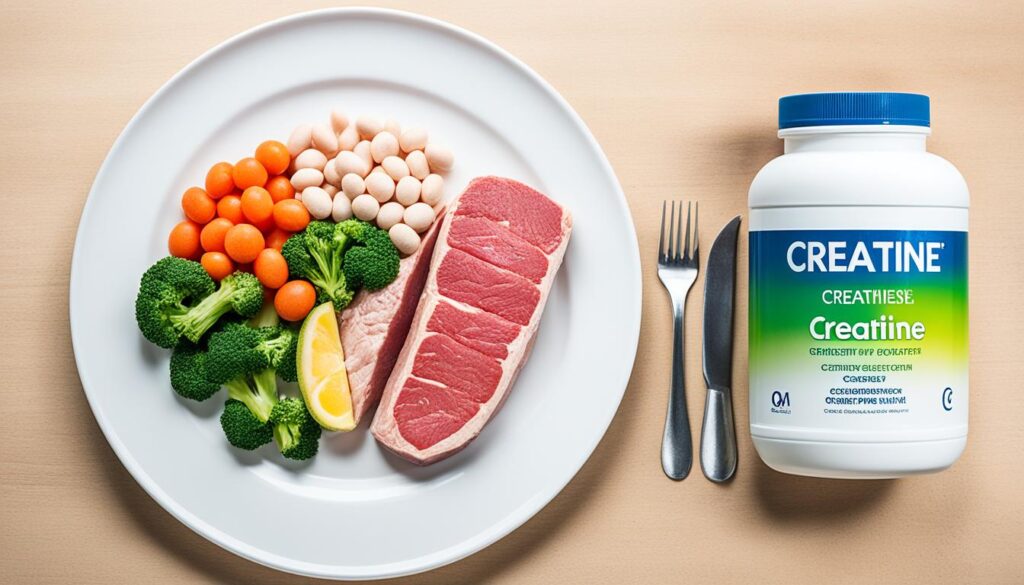
When I consider the contribution of creatine to the wellness of our older population, it’s clear that both naturally occurring and synthetic forms come into play. The balance between dietary creatine and supplementation can profoundly affect the health and functionality of muscles and bones in the elderly, making it an essential aspect of elderly nutrition and elder care. Understanding the various creatine sources is key to integrating this compound into a well-rounded senior diet plan, specifically targeting the unique physiological changes that occur with age.
Evaluating Creatine Sources: Diet vs. Supplements
Dietary creatine, primarily found in red meat and seafood, is an integral part of many seniors’ diets. However, the naturally occurring amounts may not be sufficient to offer the full array of reported benefits. This is where supplements step in, providing higher concentrations tailored to meet the increased demand of aging bodies. The discrepancy between dietary intake and the optimal levels for elderly health necessitates a careful examination of high-quality synthetic creatine supplementation as a viable alternative to natural sources.
Nutritional Strategies for Elder Care: Integrating Creatine
Integrating creatine into elder care nutritional strategies comes with the promise of enhanced muscle and bone health, especially critical in countering the risks of falls and inflammatory conditions. In my experience, older adults, particularly those with dietary restrictions like vegetarianism, may benefit significantly from creatine supplementation. It helps fill the nutritional gap and supports improved physiological functions, which can translate to a more vibrant, active lifestyle even in later years.
- Muscle strength and mass retention
- Support for bone density
- Potential reduction in fall risk
- Mitigation of inflammatory markers
It’s clear that whether it comes from red meat, fish, or a carefully measured scoop of powder, creatine holds a valuable place in the dietary considerations for the aging population. Its thoughtful application can make a significant difference in the quality of life for our cherished elderly.
Creatine Supplementation Benefits for Elderly Muscle Mass
As we delve into the realms of aging wellness, creatinine supplementation emerges as a beacon of hope against sarcopenia, the dreaded decline of elderly muscle mass. Myriad studies underscore the pivotal role creatine plays in bolstering the physiques and fortitudes of our aging population.
Through rigorous scrutiny, my assessment reveals an undeniable synergy between creatine supplementation and resistance training. This combination not only cultivates muscle, but also endows strength beyond what solitary physical exercise can offer. To elucidate the potential of creatine in ameliorating sarcopenic conditions, the following table presents a distilled synthesis of recent research findings:
| Study Parameters | Resistance Training Alone | Resistance Training with Creatine Supplementation |
|---|---|---|
| Lean Tissue Mass Increase | Moderate | Significant |
| Muscle Strength Gains | Noticeable | Markedly Higher |
| Improvement in Physical Performance | Consistent | Enhanced |
| Inflammation Mitigation | Minimal | More Pronounced |
| Sarcopenia Progression | Slowed | Greatly Reduced |
What we extract from this analysis is clear: by embracing creatine supplementation, we can cast a wider net of protection over the functional capabilities of our elders. It ignites a beacon of energy within muscles that may otherwise succumb to the toll of time, carving a path toward a firmer stance against the currents of aging.
The benefits are not merely about the augmentation of mass; they instill a deeper sense of vitality that permeates every facet of life for the elderly. As such, creatine stands out not as a mere supplement, but as a cornerstone of aging wellness, an ally in the quest to preserve the vigor that enriches the golden years.
Exploring the Link between Creatine Use and Renal Health
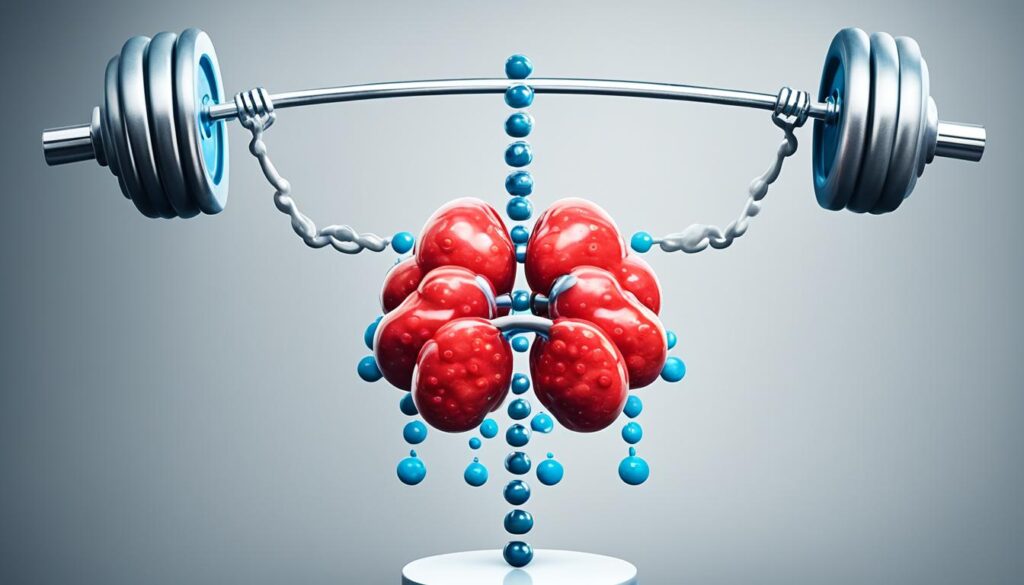
As we delve into the intricate relationship between creatine use and renal health, it’s important to understand the metabolic processes and long-term implications. Creatine has long been associated with athletic performance, but its impact on kidney function is a topic of much interest, particularly when it comes to long-term supplementation. Let’s break down how creatine metabolism plays into this dynamic.
How Creatine Metabolism Affects Kidney Function
The human body naturally synthesizes creatine, which is then broken down into creatinine, a waste product filtered out by the kidneys. The concern around creatine metabolism and renal health stems from whether high levels of supplementation could impose undue stress on the kidneys. Current findings indicate that in individuals with healthy renal function, the increased creatinine is effortlessly managed, maintaining stable kidney function.
Assessing the Safety of Long-Term Creatine Supplementation
When discussing long-term supplementation, patient history and preexisting conditions take center stage. Although substantial research validates the safety of prolonged creatine use in individuals with no kidney ailments, those with existing renal concerns should approach creatine with caution. It’s recommended that anyone considering creatine as a dietary supplement consult with health professionals, particularly if they have known kidney issues.
| Creatine Supplementation Duration | Effect on Renal Health |
|---|---|
| Short-term Use | No significant impact on healthy kidneys |
| Chronic Use in Healthy Individuals | Lack of adverse renal effects corroborated by studies |
| Use in Individuals with Renal Impairment | Requires medical supervision and personalized assessment |
In conclusion, monitoring and understanding the specifics of creatine’s interaction with renal health is crucial, especially when considering long-term supplementation. Moving forward, maintaining dialogue with healthcare providers will ensure the safe and effective use of creatine, keeping the focus on enhancing wellness while safeguarding renal function.
Kidney Function in Aging Adults: Risks and Protective Measures
As we age, our bodies undergo numerous changes, and kidney function is no exception. The decline in renal health is a natural aspect of the aging process. I emphasize the critical nature of proactive measures to support kidney function, particularly in aging adults. Healthy lifestyle choices are paramount, including maintaining proper hydration, following a balanced diet, and partaking in routine medical check-ups for early detection and management of potential kidney issues.
Renal health should not be overlooked when it comes to elder care and aging wellness. Steps can be taken to mitigate risk factors and reinforce defenses against the decline of kidney function. Awareness around these issues is essential, and ensuring that aging adults receive the support and information they need for effective elder care is a responsibility I take to heart.
- Hydration: Ensuring adequate fluid intake helps kidneys to filter waste from the blood and create urine effectively.
- Balanced Diet: A diet rich in fruits, vegetables, lean proteins, and whole grains supports overall wellness and kidney health.
- Regular Monitoring: Periodic kidney function tests can detect issues early, providing a crucial advantage in maintaining renal health.
- Control Blood Pressure and Diabetes: These are risk factors for kidney disease, so managing them is vital for kidney care.
- Review of Medications: Regular evaluations of prescriptions and over-the-counter drugs are important as some may affect kidney health.
Moreover, while creatine supplementation has demonstrated benefits for muscle and brain health, it is imperative that these advantages are carefully weighed against each individual’s renal health status. Professional medical guidance is always recommended to tailor any supplement intake to existing health profiles, ensuring the nourishment of aging wellness without compromising renal health. Health professionals play a crucial role in providing personalized care plans conducive to long-term vitality and functional independence in the elderly.
Preserving kidney function is a multifaceted endeavor, requiring diligent attention and thoughtful lifestyle decisions. In my role, I am committed to supporting aging adults on their journey to sustained renal health and overall well-being.
Resistance Training and Creatine: A Combo for Healthy Aging

As we seek strategies for healthy aging, the combination of resistance training and creatine supplementation emerges as a robust duo. This synergistic pairing is not just about enhancing physical capabilities; it’s about redefining our bodies’ potential as we age. Allow me to delve deeper into how this powerful alliance works to boost both exercise performance and muscle strength, ultimately contributing to an improved quality of life for older adults.
Boosting Exercise Performance with Creatine
My personal experience, alongside research, confirms that creatine benefits are particularly evident when it comes to exercise performance. Those engaging in resistance training notice enhanced endurance and an increase in their ability to handle high-intensity workouts. This stands as a testament to creatine’s role in facilitating rapid energy production, which is pivotal for completing strenuous exercises and routines.
The Synergistic Effects on Muscle Strength and Recovery
Another aspect where creatine truly shines is in the realm of muscle strength and recovery. After adopting creatine into my regimen, I witnessed improvements in my muscle recovery post-workout, which in turn, has helped me maintain a consistent exercise routine — a crucial element for achieving healthy aging goals. This enhanced recovery is not just about bouncing back faster; it’s also about preventing the risk of injuries and falls that are of significant concern in elder care.
Now, let’s consider how the integration of resistance training with creatine supplementation may translate into tangible health outcomes:
| Benefits of Resistance Training | Enhancements from Creatine |
|---|---|
| Increased muscle mass | Improved muscle energy storage |
| Improved bone density | Reduced muscle fatigue |
| Better joint mobility | Accelerated recovery times |
| Heightened functional performance | Greater overall exercise capacity |
By incorporating both resistance training and creatine into their lifestyle, elderly individuals can experience a powerful boost in physical performance and an enriched approach to aging that promotes independence and vitality. Through this practice, I’ve witnessed firsthand the profound impact on daily living and wellness, firmly believing that this combination can be a game-changer for many.
Cognitive and Neuromuscular Advantages of Creatine in the Elderly
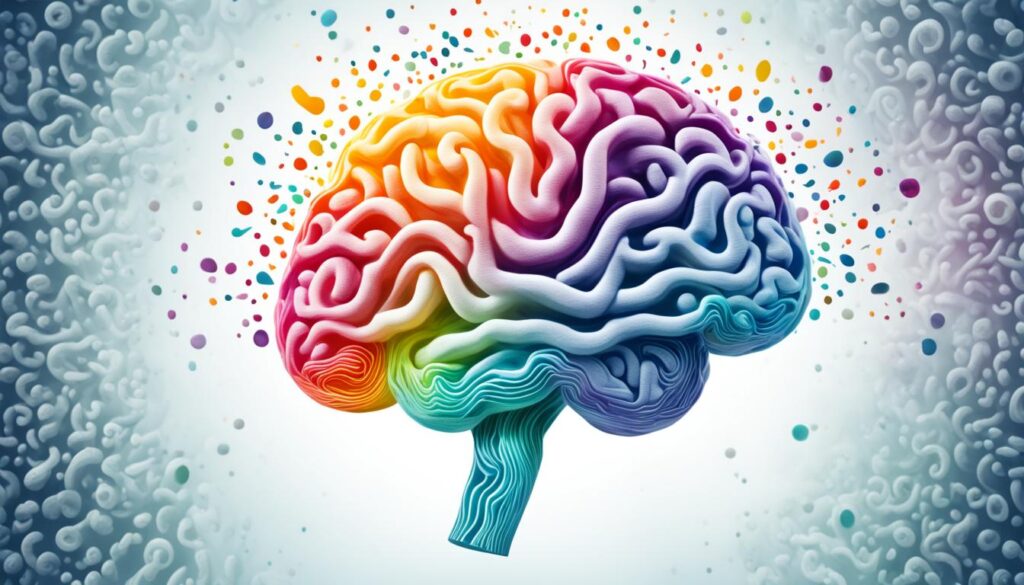
As we delve deeper into the impacts of creatine in the elderly, a compelling narrative emerges, highlighting not only its well-documented role in fostering muscle strength but also extending to the crucial realms of cognitive advantages and neuromuscular health. The scope of benefits creatine supplementation can offer is remarkable, particularly when considering the maintenance and enhancement of brain health as we age.
In my exploration, I’ve synthesized data from various research studies that underscore creatine’s potential in bolstering mental acuity and fortifying the neuromuscular system. This evidence points towards notable improvements in cognitive task performance, a domain where mental sharpness is paramount. Furthermore, it provides an insightful glimpse into creatine’s role as a guardian against mental fatigue, suggesting a stamina of the mind that many seniors would find invaluable.
| Cognitive Function | Benefit from Creatine Supplementation |
|---|---|
| Memory Recall | Enhanced Short and Long-term Memory |
| Task Processing Speed | Increased Cognitive Quickness |
| Mental Fatigue Resistance | Improved Endurance during Cognitive Tasks |
| Neuroprotection | Potential to Mitigate Age-related Decline |
The growing body of literature also sheds light on creatine’s neuroprotective properties, indicating an exciting landscape where this supplement may offer a shield against age-related neurological decline. While the full extent of these protective measures is still a field ripe for further investigation, the preliminary data paints a picture of hope for seniors seeking to preserve cognitive function and ensure their overall neuromuscular health remains robust.
In my professional opinion, embracing a supplementation strategy that includes creatine could be a paradigm shift in how we approach the golden years. By advocating for the integration of this supplement into the diets of the elderly, we may witness a transformative uplift in both mental and physical well-being.
Creatine and Kidney Health in the Elderly
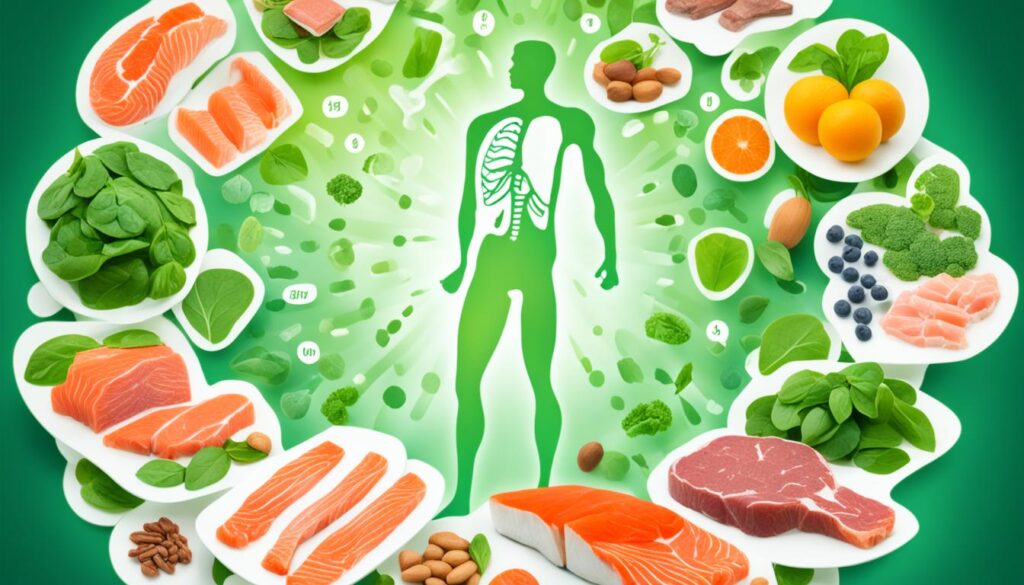
As a tone-setter for this dialogue, it’s crucial to understand that creatine is not just a performance enhancer for athletes. Its relevance extends to the geriatric population, where it plays a significant role in maintaining muscle mass and cognitive function. Yet, there remains a shroud of concern surrounding its impact on kidney health, particularly in older individuals. Let’s delve into this topic further.
Dispelling Myths: Creatine Intake and Kidney Damage
The longstanding myth that creatine intake is synonymous with kidney damage has been scrutinized extensively in scientific circles. My foray into the research provides an assuring narrative: for individuals with healthy kidneys, creatine supplementation does not invite renal distress. Highlighting this fact is essential—it quashes the unfounded fears that perpetuate among the elderly and those responsible for their care.
Monitoring Kidney Health Among Elderly Creatine Users
Meticulous elderly renal monitoring bridges the gap between enjoying the benefits of creatine intake and ensuring renal wellness. Regular kidney function tests are a prudent component of elder care, particularly for those supplementing with creatine. As I navigate my responsibility in advising such individuals, I am mindful that a balanced approach—blending clinical oversight with informed supplementation choices—can mitigate the potential for harm, dispel kidney damage myths, and capitalize on the synergy between creatine and kidney health.
Maximizing the Benefits: Optimal Creatine Dosage for Seniors
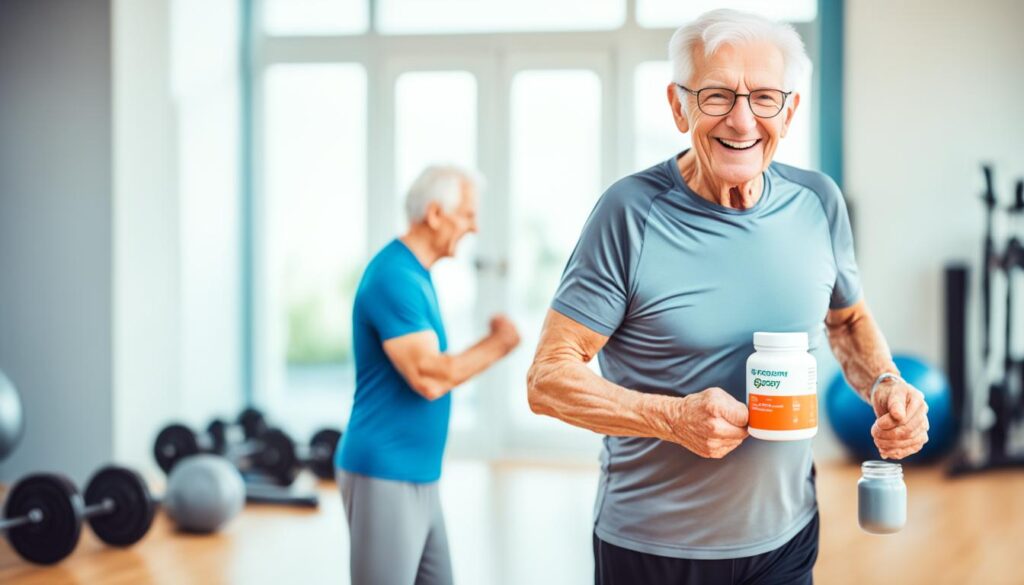
As a health-conscious individual, I recognize the importance of providing clear, researched guidelines regarding creatine dosage for seniors to enhance their elderly health. Personalized dosage plans are not only strategic but essential for tailoring creatine intake to the unique needs of aging individuals.
Personalized Creatine Dosage Plans Based on Individual Health Status
I believe that crafting personalized dosage plans for creatine intake involves thoughtful consideration of one’s health status and lifestyle choices. For example, meat-eaters already consuming 1 to 2 grams of creatine from their diet might opt for a less aggressive supplementation plan than those who abstain from animal products. Vegetarians or those with reduced dietary intake of creatine, on the other hand, might require a more robust supplementation strategy. Personalization indeed plays a pivotal role in leveraging the full spectrum of benefits offered by creatine while ensuring safety and efficacy.
Guidelines for Creatine Supplementation in Elderly Populations
When advising on supplementation guidelines, I adhere to established protocols that emphasize a dual-phase approach comprising an initial high-dose phase, which serves to saturate the muscles with creatine, followed by a lower, maintenance dose to sustain its ergonomic effects. This phased plan allows the individual’s system to adapt and maintains long-term muscle mass and cognitive function enhancements while mitigating potential risks associated with over-supplementation.
Maintaining muscle strength and cognitive health is paramount for the aging population. The integration of creatine supplementation under these guidelines can offer a proactive method to support elderly health and vitality.
Conclusion
In reviewing the scope of creatine supplementation and its impact on the well-being of our seniors, we’re brought to a fundamental consensus: this naturally occurring compound has cemented itself as a cornerstone in promoting aging wellness and elderly nutrition. The harmonious integration of creatine into aging bodies has shown promises of bolstering kidney health, a concern for many as they advance in years. My examination of this topic, fortified by scientific research and clinical insights, reaffirms that creatine can indeed be a powerful ally in supporting kidney health and muscular vitality.
With age, maintaining resilience is paramount, and creatine offers a helping hand — fortifying muscle mass, augmenting strength, and potentially safeguarding cognitive faculties. But the key to unlocking these benefits lies in approach and prudence. Personalized attention to dosing, taking into account the distinct needs and conditions of each elder, ensures that creatine supplementation is both effective and secure. Whether it’s a part of a rehabilitation regime or a preventative measure, these nuances are vital in elderly care.
Ultimately, in my experiential view, there is no one-size-fits-all answer in the realm of supplements and nutrition for our aging populace. Yet, with vigilant monitoring and ongoing dialogue with healthcare providers, creatine supplementation stands as a beacon of hope for enhanced quality of life. It fosters not only the strength of the body but the essence of health longevity. This additive to elderly nutrition and elder care plans is poised, under judicious governance, to contribute positively to the tapestry of healthy aging.
FAQ
What is creatine and how is it produced in the body?
Creatine is a naturally occurring compound, synthesized from amino acids, that plays an essential role in energy production, primarily in muscle and brain tissue. The human body produces about 1 gram of creatine daily through the liver, pancreas, and kidneys. It can also be obtained from dietary sources such as red meat and seafood, or through supplementation.
What role does creatine play in muscle function and strength for the elderly?
Creatine is vital for muscle function as it aids in the production of energy during high-intensity activities. It becomes increasingly important for the elderly, as it can enhance muscle strength and mass, countering age-related muscle deterioration known as sarcopenia. This, in turn, contributes to better physical performance and quality of life for aging individuals.
As individuals age, there is a natural decline in muscle mass and strength, which can partly be attributed to changes in the body’s ability to produce and store creatine. The decrease in creatine synthesis and storage can lead to diminished muscle function, making supplementation a potentially beneficial strategy for maintaining muscle health in the elderly.
What are the differences between dietary creatine sources and supplements?
Dietary creatine is primarily found in red meat and seafood, but these sources provide lower amounts of creatine compared to synthetic supplements. Supplementation enables individuals, especially vegetarians or those with lower dietary intake, to achieve higher levels of creatine that can have significant benefits for aging physiologies.
How can creatine supplementation benefit elderly muscle mass?
Research shows that creatine supplementation, particularly when combined with resistance training, leads to more significant improvements in lean tissue mass and muscle strength compared to resistance training alone. It can help mitigate sarcopenia, which is the age-related loss of muscle mass, enhancing aging wellness.
How does creatine metabolism affect kidney function?
Creatine is metabolized into creatinine, which is excreted by the kidneys. Concerns have been raised about the effects of creatine supplementation on kidney health, especially in the elderly. However, studies indicate that creatine does not impair the kidney function of healthy older adults. Nonetheless, individuals with preexisting kidney conditions should consult healthcare professionals before using creatine supplements.
Is long-term creatine supplementation safe for elderly individuals?
Yes, evidence suggests that long-term creatine supplementation is generally safe for healthy older adults. It does not appear to adversely affect kidney function and can provide muscle and cognitive benefits. Persons with existing renal conditions must seek medical advice prior to supplementation to ensure it aligns with their health needs. Regular monitoring of kidney health is also recommended for elderly creatine users.
Can creatine enhance exercise performance in the elderly?
Yes, creatine supplementation can boost exercise performance in the elderly. It works synergistically with resistance training to improve muscle strength, recovery, and overall exercise capacity. This not only supports healthy aging but also reduces the risk of falls, a significant concern in elder care.
What are the cognitive and neuromuscular benefits of creatine for the elderly?
Creatine supplementation in the elderly has been linked to improvements in cognitive task performance, including better resistance to mental fatigue. It has also been associated with neuromuscular health benefits, offering potential neuroprotective advantages that could protect against age-related neurological declines.
How can elderly creatine users ensure they maintain good kidney health?
Elderly creatine users can maintain good kidney health by regularly monitoring kidney function, staying well-hydrated, and maintaining a balanced diet. It is crucial to consult with healthcare providers to determine appropriate supplement doses and to discuss any preexisting conditions that may affect renal health.
What factors are considered when determining the optimal creatine dosage for seniors?
The optimal creatine dosage for seniors considers individual health status, dietary habits, and specific health goals. For meat-eaters, the existing creatine intake from their diet should be considered, while vegetarians may benefit from higher supplementation doses. Personalized plans can ensure seniors reap the maximum benefits from creatine supplementation while minimizing potential side effects.
Are there guidelines for creatine supplementation in elderly populations?
There are guidelines that recommend a safe dosage regimen for creatine supplementation in the elderly, which may include a loading phase followed by a maintenance phase. This approach is designed to improve muscle mass and cognitive function while considering the unique physiological needs of seniors. Always consult with a healthcare provider before starting any supplementation regimen.

